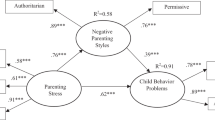Abstract
The goal of the current study was to examine how changes in parenting due to a parenting intervention designed to decrease permissive parenting affected the quality of children’s peer interactions. Forty-nine mothers of toddlers aged 2–3 years participated in a 12-week intervention in which half got hands-on training and practice using positive guidance in a toddler classroom setting, while the other half learned positive guidance solely via a seminar format. To observe children’s peer interactions, toddlers were divided into 8 groups of 5–7 children mixed across condition. Observers coded mothers’ empathy, permissiveness, and positive guidance parenting strategies. Children’s peer interactions were coded for antisocial behaviors, verbal aggression, physical aggression, prosocial behaviors, positive social bids, and empathy. Prior analysis of this intervention indicated that mothers in both conditions showed reductions in permissiveness over the course of the intervention. Results from the present study indicated that reductions in permissiveness predicted decreases in toddlers’ verbal aggression. Maternal empathy was a moderator such that mothers low in empathy who got hands-on training in positive guidance had children who demonstrated the greatest reductions in antisocial behaviors.

Similar content being viewed by others
References
Aiken, L. S., & West, S. G. (1991). Multiple regression: Testing and interpreting interactions. Thousand Oaks, CA: Sage.
American Psychiatric Association. (2000). Diagnostic and statistical manual of mental disorders (4th ed.) (text rev.). Washington, DC: Author.
Burton, L., Roetzel, A., Saunders, R., & Jacobvitz, D. (2009). The discipline techniques of permissive parenting: Outcomes of self-report and observational data. Denver, CO: Poster session presented at the Society for Research on Child Development Biennial Meeting.
Cummings, E., & Cicchetti, D. (1990). Toward a transactional model of relations between attachment and depression. In M. T. Greenberg, D. Cicchetti, & E. Cummings (Eds.), Attachment in the preschool years: Theory, research, and intervention (pp. 339–372). Chicago, IL: University of Chicago Press.
Cummings, E. M., & Davies, P. T. (1994). Maternal depression and child development. Journal of Child and Psychology and Psychiatry and Allied Disciplines, 35, 73–112.
Dix, T., Gershoff, E. T., Meunier, L. H., & Miller, P. C. (2004). The affective structure of supportive parenting: Depressive symptoms, immediate emotions, and child-oriented motivation. Developmental Psychology, 40(6), 1–16.
Downey, G., & Coyne, J. C. (1990). Children of depressed parents: An integrative review. Psychological Bulletin, 108(1), 50–76.
Flicker, E. S., & Hoffman, J. A. (2002). Developmental discipline in the early childhood classroom. Young Children, 57(5), 83–89.
Gartrell, D. (2004). The power of guidance: Teaching social-emotional skills in early childhood classrooms. Clifton Park, NY: Thomson Delmar Learning.
Harvey, N., & Fischer, I. (2005). Development of experience-based judgment and decision making: The role of outcome feedback. In T. Betsch & S. Haberstroh (Eds.), The routines of decision making (pp. 119–137). Mahwah, NJ: Lawrence Erlbaum Associates.
Holmbeck, G. N. (2002). Post hoc probing of significant moderational and mediational effects in studies of pediatric populations. Journal of Pediatric Psychology, 27, 87–96.
Honig, A. S. (2002). Secure relationships: Nurturing infant/toddler attachment in early care settings. Washington, DC: National Association for the Education of Young Children.
Honig, A. S. & Martin, P. M. (2009). Does brief in-service training help teachers increase turn-taking talk and Socratic questions with low-income preschoolers. NHSA Dialog: A research to Practice Journal, for the Early Intervention Field, 12(1), 60–65.
Johnson, S., Dweck, C., & Chen, F. (2007). Evidence for infants’ internal working models of attachment. Psychological Science, 18(6), 501–502.
Lee, S., Vandell, D. L., & Posner, J. K. (1998). Harsh, firm, and permissive parenting in low-income families. Journal of Family Issues, 19, 483–507.
Main, M., Kaplan, N., & Cassidy, J. (1985). Security in infancy, childhood, and adulthood: A move to the level of representation. Monographs of the Society for Research in Child Development, 50(1–2), 66–104.
Patock-Peckham, J. A., Cheong, J., Balhorn, M. E. & Nagoshi, C. T. (2001). A social learning perspective: A model of parenting styles, self-regulation, perceived drinking control, and alcohol use and problems. Alcoholism: Clinical and Experimental Research, 25(9), 1284–1292.
Saunders, R., McFarland-Piazza, L., Jacobvitz, D., Hazen, N., & Burton, R. Maternal knowledge and behaviors regarding discipline: The effectiveness of a hands-on parent education program in positive guidance. Journal of Child Development and Family Studies (in press).
Sroufe, A., & Fleeson, J. (1986). Attachment and the construction of relationships. In W. Hartup & Z. Rubin (Eds.), Relationships and development. Hillsdale, NJ: L. Erlbaum.
Author information
Authors and Affiliations
Corresponding author
Rights and permissions
About this article
Cite this article
Christopher, C., Saunders, R., Jacobvitz, D. et al. Maternal Empathy and Changes in Mothers’ Permissiveness as Predictors of Toddlers’ Early Social Competence with Peers: A Parenting Intervention Study. J Child Fam Stud 22, 769–778 (2013). https://doi.org/10.1007/s10826-012-9631-z
Published:
Issue Date:
DOI: https://doi.org/10.1007/s10826-012-9631-z




